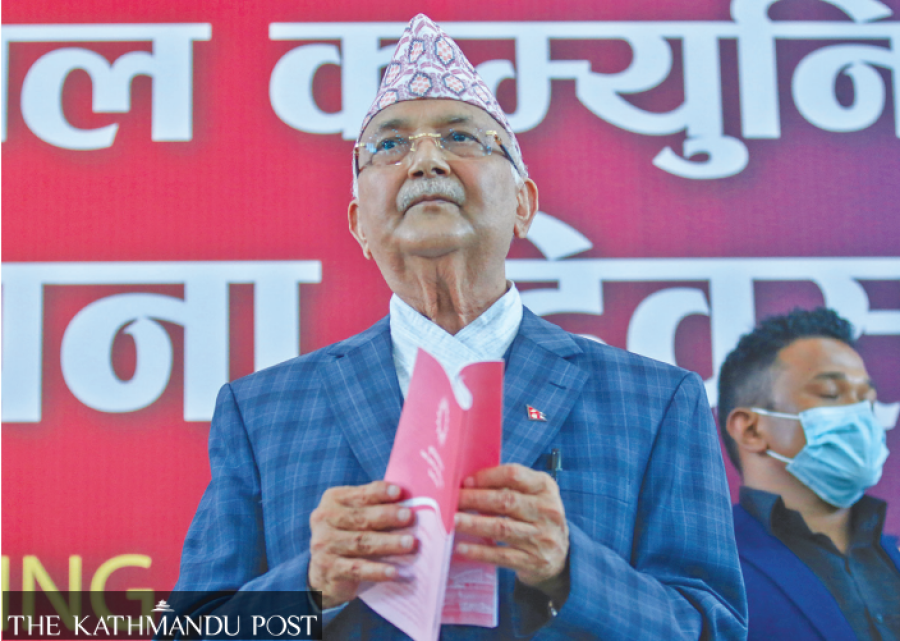Politics
UML leaders make lofty claims in public, but fear serious setback in internal assessments
Failure to field right candidates and lack of an encouraging environment for the rank and file could prove costly for the party.
Purushottam Poudel
As the November elections draw closer, CPN-UML leaders claim in public that the party will emerge as the largest force once again despite other major parties uniting against it. The ruling Nepali Congress leads an electoral alliance of CPN (Maoist Centre), CPN (Unified Socialist), Loktantrik Samajbadi Party and the Rastriya Janamorcha.
To bolster its chances, the UML has also forged partnerships with parties including the Janata Samajbadi, Rastriya Prajatantra Party (RPP) and RPP-Nepal for the November 20 polls.
UML vice-chair Asta Laxmi Shakya says she is confident of her party outperforming rivals in the elections. “Though I cannot disclose the number of the seats our party hopes to win in the federal elections, we believe the UML will emerge as the largest party,” Shakya told the Post.
Party insiders, however, confide in informal conversations that the party might face a serious setback in the polls.
“The party might garner only 30 to 35 seats of the federal parliament and the votes received under the proportional representation category might be of similar level,” said a UML central leader. This was the party’s internal assessment made before it forged an alliance with the Janata Samajbadi Party.
A Standing Committee meeting before the local level elections had projected that the party would win 160 to 165 top seats at the most. The final results of the local elections proved the early calculation wrong as the party won a total of 206 local units. However, it was less than what it achieved in the previous elections as the party had managed to garner 294 local units then. This time, the UML fought against the five-party alliance led by the ruling Nepali Congress in the local elections as well.
UML leaders now confide that the party may face serious setbacks in the upcoming elections also because of top leaders’ failure to field right candidates and create an encouraging environment within the party. Some leaders including Standing Committee member Ghanashyam Bhusal have quit the party accusing mainly the party chair KP Sharma Oli of sidelining them.
“The UML had to field the best candidates from among the party’s aspirants to fight against the common candidate of the ruling coalition,” said a UML leader requesting anonymity. “However, the party has made mistakes in the selection of candidates and its impact will be seen on the results.”
Vice-chair Shakya also admits that the party failed to select the right candidates.
“The party had the opportunity to choose the best candidates but it didn’t do so,” Shakya said.
In an internal meeting, leaders in charge of the UML’s provincial committees had told their leadership that the party might face a serious debacle if the ruling coalition remained intact in the parliamentary and provincial elections. Reporting their assessments to the Standing Committee on August 23, the provincial leaders had projected a probable electoral outcome.
Shakya confirmed that such reports were discussed in the latest Standing Committee meeting.
“It is true that the provincial leaders had presented their reports predicting the possible electoral scenario,” Shakya told the Post, without disclosing the number of seats that the party was likely to win.
The leaders added that the circumstance of the time when the party held the meeting was different because until then the Janata Samajbadi was part of the ruling coalition. Later, the party left the camp and forged an electoral alliance with the UML. With this development, UML leaders are optimistic in averting some setbacks.
Forging an electoral partnership with the Janata Samajbadi, the UML has succeeded to weaken the Congress-led alliance. Partnering with the Janata Samajbadi in Madhesh is certainly a respite for the UML. But party insiders say it still doesn’t make strong ground for the party in Madhesh districts.
Prabhu Sah, who was taken as a pillar of the UML in Madhesh Province, is running elections as an independent candidate expressing serious dissatisfaction with the party leadership. He is contesting the election from Rautahat-3 independently. Sah has also fielded other 27 candidates in the Madhesh province. He felt sidelined mainly after the party forged an electoral alliance with the Janata Samajbadi and came up with his own electoral plans.
“The party would be in a stronger position if Sah had remained in the party even after the electoral alliance with Janata Samajbadi Party but his exit is a setback for the party,” said a UML central committee member.
Apart from the strength of the ruling coalition, UML leaders fear that their party will also be impacted seriously by party chair Oli's move to dissolve parliament twice because the rivals would raise the issue during electioneering.
Oli dissolved the legislature twice after he could not manage the rift within the party.
When the entire country was in crisis, top leaders of the then ruling Nepal Communist Party were continuously wrangling over their roles. The Oli government was widely criticised for failing to control the pandemic.
“We expect to fare better than the Congress did last election, but the situation might not be in our favour,” said a leader on condition of anonymity.
In the last federal election, the UML and the Maoist Centre had forged an alliance. The Congress won only 23 seats in the direct election while securing 40 seats under the proportional representation system.




 17.12°C Kathmandu
17.12°C Kathmandu















